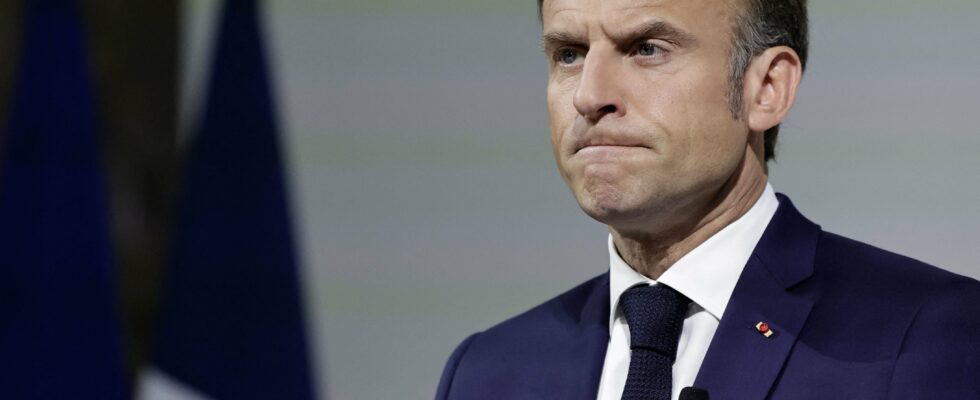It was as expected as it was feared. The arrival at the top of the National Rally (RN) in the first round of the legislative elections had been anticipated by almost all the polls carried out since the announcement of the dissolution of the Assembly on June 9. Thus, as pointed out The Geneva Tribune Sunday evening, “the question was not whether the far right was going to come out on top in this first round of the French legislative elections, but with what score.”
And this one is at the very least humiliating for the Macronist camp: nearly 33% of voters who turned out slipped an RN ballot into the ballot box. That’s almost ten points more than for the presidential majority, which barely exceeded 20% of votes cast. A score that’s enough to send shivers down the spines of the majority’s outgoing deputies.
The enigma or the puzzle of triangles
And for good reason: the results of the first round confirmed it and therefore plunge the country into an unprecedented political and institutional uncertainty. Will the RN obtain enough seats to enter Matignon? Will a majority emerge on July 7? Will Macron’s party honor its promise to withdraw its candidates in favor of those best placed against the far right? The Anglo-Saxon press understands the enormous uncertainty weighing on France due to “the number of three-way races”: 301 possible, compared to only 8 in the 2022 legislative elections.
A number which could, however, decrease significantly in the event of withdrawals promised by the left alliance and the presidential majority, notes the Corriere della Sera. “With almost half of Assembly constituencies likely to become three-way contests, the possibility of an anti-RN “republican front” clearly exists – but the extent of cross-party cooperation will be crucial, as will the desire of voters to vote tactically”, notes The Guardian.
Asking your candidates to withdraw? Déjà vu in 2007 and 2012. The fact remains that it is a “final gesture of despair”, believes Corriere della Serawho nevertheless acknowledges that the strategy could “prevent Jordan Bardella from obtaining an absolute majority”. And thus to apply a “racist” policy which advocates “national preference between citizens”, castigates The evening, warning against “a popular coronation which crucifies the political class”.
An “empty” potential future prime minister
Because behind this smooth figure, this Jordan Bardella “always well dressed” according to the formula ofThe Countrythere is a “phenomenal void”, criticizes Régis Jauffrey in the columns of Corriere della Sera: “He has not had higher education, he does not study files, he does not know the figures. For each question, he found an answer that resembles a magic wand.” Even more abrasive, the transalpine daily depicts a neophyte of politics “has until now not even administered a building and has not shown much “something more than good looks, a well-trained physique and a smooth talker.”
And yet, Marine Le Pen’s young wolf has never been so popular. According to El País, the RN owes its electoral breakthroughs largely to the man who could well become, at 28, the youngest Prime Minister in French history. “He gave the definitive impetus to this process of normalization of a party hitherto rejected by large sectors of the population and the French establishment,” specifies the Spanish daily. across the Rhine, Bild believes, however, that by having broken with the AfD, Marine Le Pen had managed to strengthen her position as leader of the hard right in Europe, and thus to break the cordon santé which appears today more than ever outdated.
Emmanuel Macron’s responsibility
The fact remains that the responsibility for a possible rise to power of the extreme right lies above all with the President of the Republic. Emmanuel Macron is described as “weakened and isolated” by The Stamp. First, because he chose to dissolve the National Assembly even though the RN had just achieved its best electoral performance in the European elections, recalls the Wall Street Journal. This is why, although he assures that he will not resign, international observers remain on their guard: “We recently realized that Macron is as unpredictable as Donald Trump,” assumes Régis Jauffrey in the Corriere della Sera.
In embassies and chancelleries, people are scratching their heads to explain what happened in Emmanuel Macron’s when announcing early legislative elections. “Macron made this decision alone, he will have to take sole responsibility for it. But he seems to see the situation differently, as if he were currently living in a parallel universe,” scathes the German weekly The Mirror, whose latest cover explores “the fall of France”.
Then because he did not know how to stop the “irrational pessimism”, noted by The Confidential. Immigration, purchasing power, excessive taxation, regulation… Seven years after rising to power, “Emmanuel Macron has failed”, concludes the Spanish daily. Finally, because he “lost contact with the target electorate of the National Rally”, decipher our colleagues from New York Times. The Spectator in particular criticizes a head of state driven by “arrogance and contempt for his fellow citizens, from the bottom to the top.”
The specter of institutional blockage
With this dissolution, Emmanuel Macron is not only running the risk of the arrival of the extreme right: he is also casting the shadow of institutional deadlock over the country. “In such an impasse, experts fear a political deadlock that could last a year. Only then will the president be able to call new elections again,” warn our colleagues at From the world.
The British The Spectator counts four big losers from this “gamble”: the stability of the Fifth Republic, the European Union, France’s international stature, but “above all and before all”, Emmanuel Macron himself. And he anticipates: “He will be the negative political heir of men like the vain President Maréchal Mac Mahon who, in trying to make himself heard, was forced to keep quiet”.
